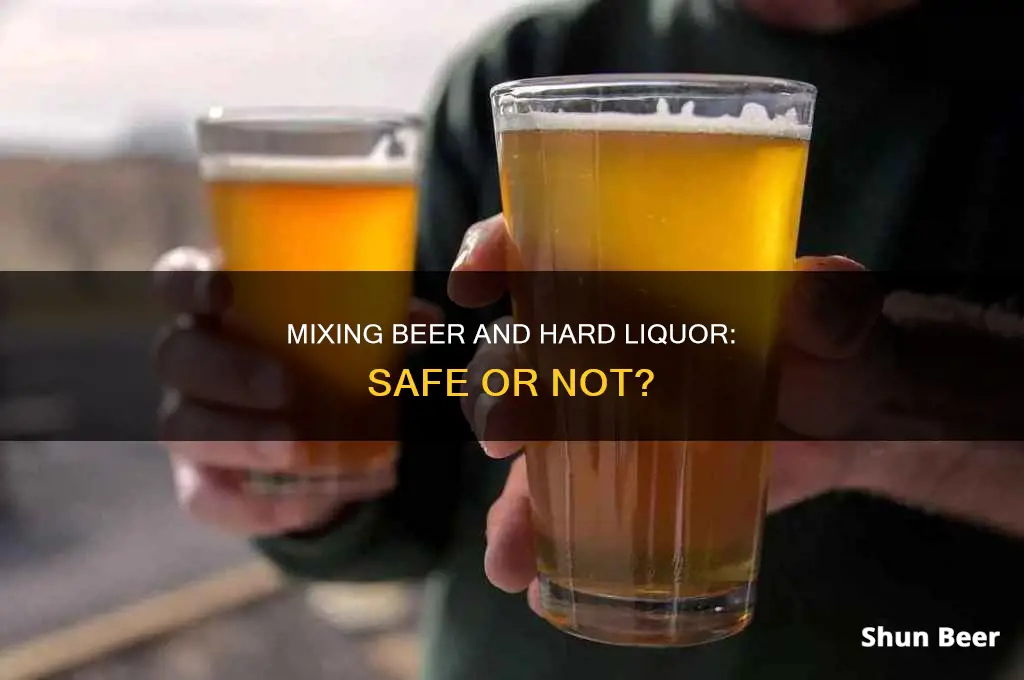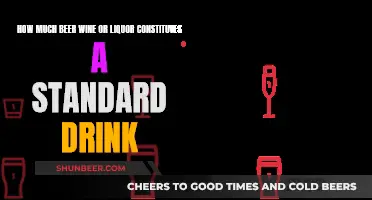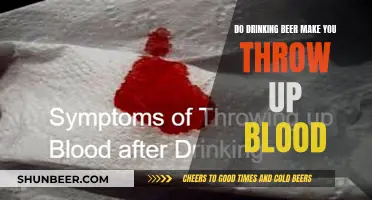
There is a popular saying that goes, beer before liquor, never been sicker; liquor before beer, you're in the clear. This saying suggests that drinking beer after hard liquor will result in a worse hangover. However, modern research has disproven this myth. The order in which alcoholic beverages are consumed does not significantly affect the severity of a hangover. Instead, the amount of alcohol consumed is a more critical factor in determining the risk and severity of a hangover.
| Characteristics | Values |
|---|---|
| Drinking beer before liquor | May make you sicker |
| Drinking liquor before beer | You're in the clear |
| Amount of alcohol | More significant than the type of alcohol consumed |
| Drinking order | Unlikely to influence hangover severity |
| Hangover prevention | Drink in moderation, stay hydrated, get enough sleep |
What You'll Learn

The saying: Beer before liquor, never sicker; liquor before beer, you're in the clear
The saying, "Beer before liquor, never sicker; liquor before beer, you're in the clear," is a popular phrase with unknown origins. It is based on the idea that drinking alcoholic beverages in a particular order will reduce the risk and severity of a hangover. However, modern research has disproven this myth. A 2019 study examined the effect of beer and wine consumption in various orders and combinations and found that drinking order and type of alcohol did not influence hangover intensity.
The amount of alcohol consumed has a more significant effect on hangover severity than the type of alcohol or the order of consumption. High blood alcohol levels are more likely to induce a hangover than low blood alcohol levels. Therefore, to reduce the risk or severity of a hangover, it is important to drink less alcohol, regardless of the type or order of consumption.
There are a few factors that can affect the rate of alcohol absorption and intoxication. The volume of alcohol consumed is one factor. Cocktails and shots tend to be consumed faster and in smaller volumes compared to beer, which is larger and takes longer to drink. Therefore, drinking beer first may result in a lower alcohol consumption rate compared to starting with cocktails or shots.
Another factor is the preparation of the alcohol. A 2007 study found that vodka served diluted with carbonated or still water was absorbed faster than vodka served neat. This suggests that the way alcohol is prepared and served can impact the rate of absorption and intoxication.
In conclusion, while the saying "beer before liquor, never sicker; liquor before beer, you're in the clear" has persisted for many years, there is little scientific evidence to support it. The order of consumption has minimal impact on hangover severity, and the amount of alcohol consumed is a more critical factor. To reduce the risk of a hangover, it is important to drink in moderation, stay hydrated, and get sufficient sleep.
Flu Shot and Beer: Is It Safe?
You may want to see also

The amount of alcohol matters more than the type
The idea that drinking beer after hard liquor will make you sicker has been a widely popular belief. The saying goes, "beer before liquor, never sicker; liquor before beer, you're in the clear." However, modern research has debunked this myth.
The amount of alcohol consumed has a more significant effect on a person's hangover than the type of alcohol they consume. The severity of a hangover is directly related to the amount of alcohol a person consumes, regardless of the type of alcoholic beverage or the order in which the drinks are consumed.
The total amount of alcohol you consume is more important than the type of drink when it comes to hangovers. A 2019 study compared the hangover severities of participants who drank only beer, only wine, beer and then wine, or wine and then beer. The results showed that neither the type nor the order of alcoholic beverages significantly affected the intensity of the hangover.
The International Spirits & Wines Association of India (ISWAI) has also emphasized that alcohol is alcohol, regardless of its form. They state that the misconception that distilled spirits are "stronger" than beer or wine stems from the fact that spirits have a higher alcohol content by volume (ABV). However, standard serving sizes always contain the same amount of alcohol, which is typically defined as 10g of alcohol. For example, a 99ml glass of wine at 13% ABV, a 30ml measure of spirits at 42.8% ABV, and a 257ml glass of beer at 5% ABV all contain the same amount of alcohol.
Therefore, it is important to focus on responsible drinking and moderation, regardless of the choice of beverage. To reduce the risk and severity of a hangover, the key is to drink less alcohol and stay within the recommended alcohol consumption guidelines.
Beer Batters: How Do They Work?
You may want to see also

Carbonated drinks irritate the stomach lining
There is a popular saying that goes, "beer before liquor, never been sicker; liquor before beer, you're in the clear." This suggests that drinking beer after hard liquor can make you feel more unwell. However, modern research has disproven this myth. A 2019 study found that neither the type nor the order of alcoholic beverages affected hangover intensity.
Carbonated drinks, such as beer, can irritate the stomach lining. Here are some reasons why:
They Can Fill Your Stomach With Gas
Carbonated drinks introduce air into your stomach, similar to eating or drinking too fast. This can cause stomach pain and bloating. The carbonation increases gastric volume, leading to feelings of fullness and discomfort.
They May Contain Irritating Additives
Carbonated drinks often contain added sugars, caffeine, and artificial sweeteners, which can have negative health effects. Caffeine can irritate the stomach, especially for people with irritable bowel syndrome (IBS). Artificial sweeteners can cause a laxative effect, leading to diarrhea.
They Can Aggravate Digestive Conditions
While carbonated drinks are not linked to chronic health issues like IBS or gastroesophageal reflux disease (GERD), they can aggravate existing digestive conditions. The carbonation and acidity may worsen symptoms such as bloating and gas.
They Can Affect Your Stomach Acid
Carbonated drinks can slightly alter pH levels in the body and add air and pressure to the stomach and intestines. This can contribute to acid reflux, although the effect is inconsistent and depends on the individual.
They May Cause Gas and Bloating
The carbonation in carbonated drinks can cause gas and bloating. The National Institute of Diabetes and Digestive and Kidney Diseases states that carbonated beverages move more air into the digestive tract, leading to bloating, burping, or gas.
Beer Station on Carnival Fantasy: How Does It Work?
You may want to see also

Liquor before beer may slow blood alcohol spikes
There is a popular saying that goes, "Beer before liquor, never been sicker; liquor before beer, you're in the clear." This saying refers to the idea that drinking beer after hard liquor will result in a worse hangover or make you feel sicker. However, there is little scientific evidence to support this claim.
One theory behind the saying suggests that liquor has a higher alcohol content than beer and is therefore more likely to spike your blood alcohol levels in a short period. As a result, finishing the night with liquor after drinking beer can quickly increase your blood alcohol content, leading to a more severe hangover.
On the other hand, starting your evening with liquor and ending with beer may slow down the spikes in blood alcohol levels. This is because beer typically has a lower alcohol content than liquor. By starting with liquor, you may reach a certain level of intoxication at a faster rate compared to when you drink beer first. If you continue drinking and switch to beer, the slower absorption of alcohol may give your body some time to catch up and potentially limit the severity of a hangover.
However, it is important to note that the order in which you consume alcoholic beverages is not the primary factor that determines whether you will experience a hangover or not. The total amount of alcohol consumed, regardless of the type of drink, is a more significant factor in influencing hangover severity. Additionally, other factors such as the frequency of drinking, smoking, genetics, and whether you ate before drinking also play a role in the likelihood of developing a hangover.
While the saying "liquor before beer, you're in the clear" may not be entirely accurate, it is always important to drink responsibly and in moderation to reduce the risk of negative health consequences.
Beer and Health: One Beer a Day, Okay?
You may want to see also

Drinking order is unlikely to influence a hangover
The popular saying goes, "beer before liquor, never been sicker; liquor before beer, you're in the clear". This implies that drinking beer after drinking hard liquor will make you feel worse. However, this is just a myth.
Despite the elaborate theories, the order in which you consume your drinks is unlikely to influence whether you experience a hangover the next day. Alcohol begins to be absorbed into your bloodstream as soon as it reaches your stomach. Thus, all the alcohol you drank the night before will have been absorbed well before your hangover takes effect.
The only way to completely avoid a hangover is to not drink alcohol or to keep alcohol intake to a minimum. There is no cure for a hangover other than time. However, to help ease hangover symptoms, it is recommended to stay hydrated, reduce alcohol consumption, and get plenty of sleep.
Drinking Beer on Chicago Streets: What's the Law?
You may want to see also
Frequently asked questions
No. It's not the order in which you drink beer and liquor that will make you sick, but how much you drink.
Carbonated drinks like beer and sparkling wine can irritate the stomach lining, increasing the rate of alcohol absorption. People also tend to drink more beer than liquor, so they may blame the last thing they drank for feeling sick.
Some say it's better to start with liquor and transition to beer. This is because your inhibitions decrease as you drink more alcohol, so starting with a beverage with a higher alcohol content means you'll tend to drink more.







